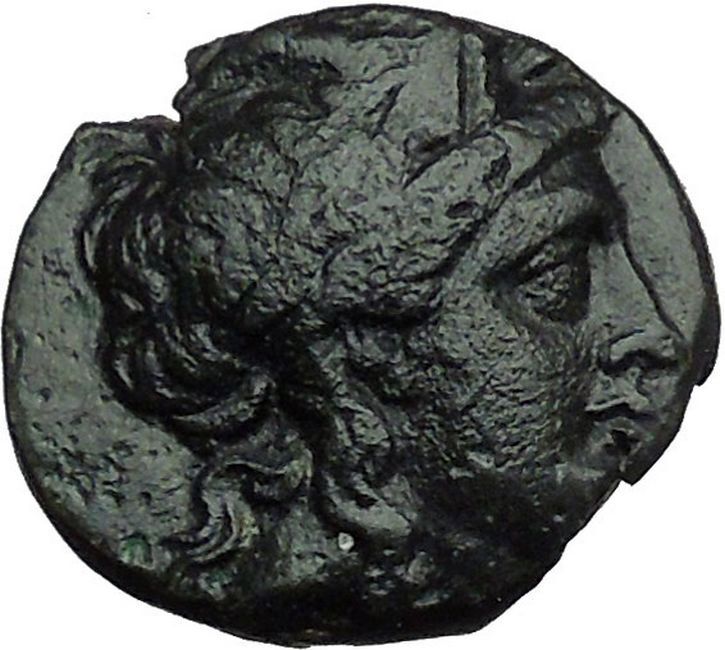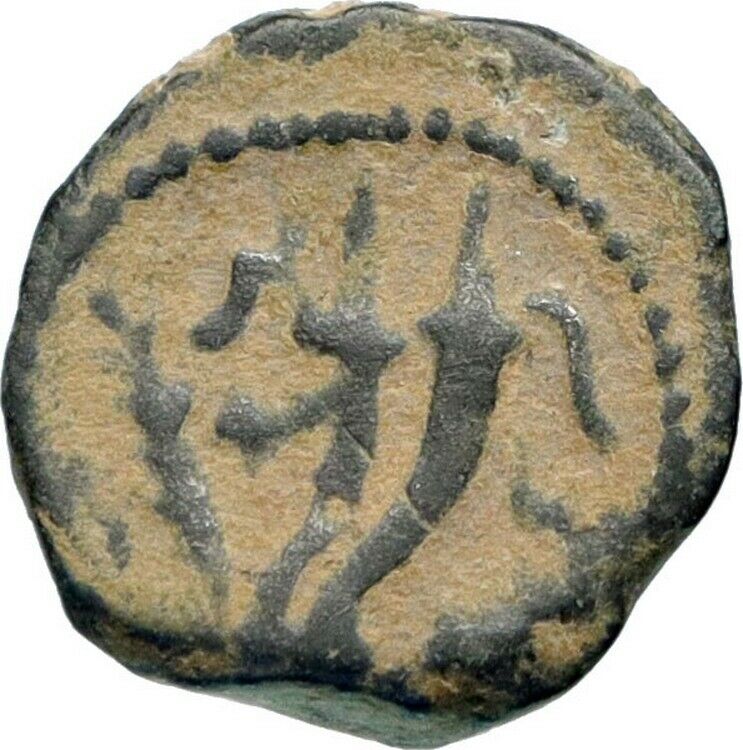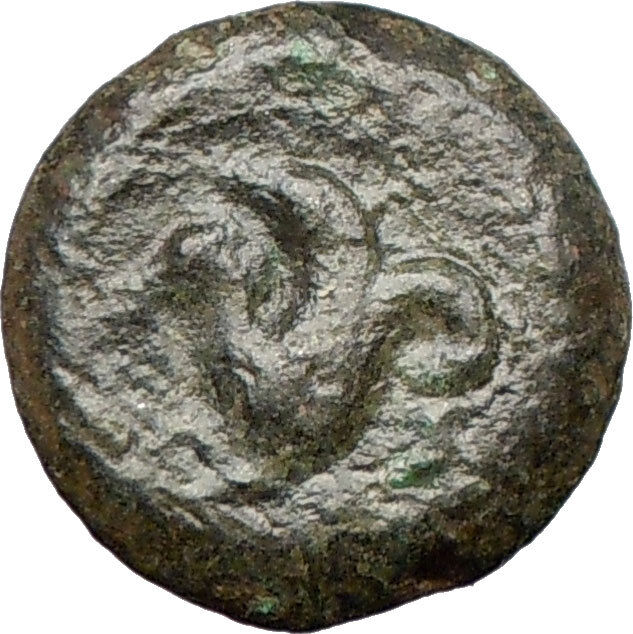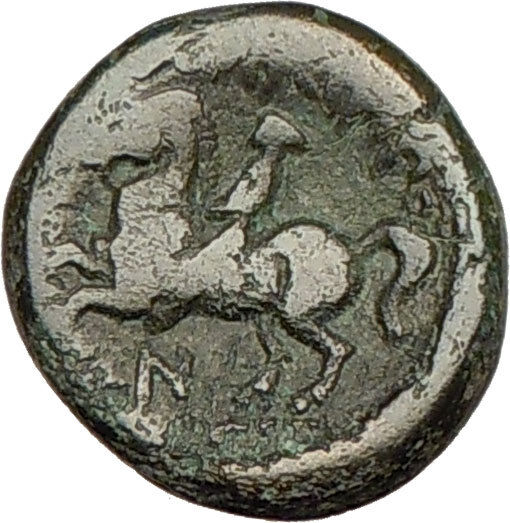|
India –
Kushan Empire
Vima Kadphises – King circa 113-127 A.D.
Bronze Tetradrachm 25mm
(16.50 grams) Main mint in Begram. Struck circa 113-127 A.D.
Reference: MK
762; ANS Kushan 274-99; Donum Burns 87-105
Vima Kadphises standing facing,
head to left, sacrificing over altar; trident to left, tamgha and club to right.
Siva standing facing, holding trident; behind, the bull Nandi standing to right;
Buddhist triratana (“Three Jewels”) to left.
You
are bidding on the exact item pictured, provided
with a Certificate of Authenticity and Lifetime
Guarantee of Authenticity.
 Shiva Shiva
(/ˈʃɪvə/; Sanskrit: शिव, lit. ‘The
Auspicious One’ IAST:
Śiva), also known as Mahadeva
(/ˈməhɑː dɛvə/; Sanskrit: महादेव:,
lit. ‘The Great God’ is one of
the principal deities of Hinduism. He is the
Supreme Being in Shaivism, one of the major
traditions within Hinduism.
Shiva has
pre-Vedic tribal roots, and the figure of Shiva
as we know him today is an amalgamation of
various older non-Vedic and Vedic deities,
including the Rigvedic storm god Rudra who may
also have non-Vedic origins, into a single major
deity.
Shiva is known as “The Destroyer”
within the Trimurti, the triple deity of supreme
divinity that includes Brahma and Vishnu. In the
Shaivite tradition, Shiva is the Supreme Lord
who creates, protects and transforms the
universe. In the Shakta tradition, the Goddess,
or Devi, is described as one of the supreme, yet
Shiva is revered along with Vishnu and Brahma. A
goddess is stated to be the energy and creative
power (Shakti) of each, with Parvati (Sati) the
equal complementary partner of Shiva. He is one
of the five equivalent deities in Panchayatana
puja of the Smarta tradition of Hinduism.
Shiva is the primal Atman (Self) of the
universe. There are many both benevolent and fearsome depictions of Shiva.
In benevolent aspects, he is depicted as an omniscient Yogi who lives an
ascetic life on Mount Kailash as well as a householder with wife Parvati and
his two children, Ganesha and Kartikeya. In his fierce aspects, he is often
depicted slaying demons. Shiva is also known as Adiyogi Shiva, regarded as
the patron god of yoga, meditation and arts.
The iconographical
attributes of Shiva are the serpent around his neck, the adorning crescent
moon, the holy river Ganga flowing from his matted hair, the third eye on
his forehead, the trishula or trident, as his weapon, and the damaru drum.
He is usually worshipped in the aniconic form of lingam. Shiva is a
pan-Hindu deity, revered widely by Hindus, in India, Nepal and Sri Lanka.
 Nandi Nandi
(Sanskrit: नन्दि, Tamil: நந்தி, Kannada: ನಂದಿ, Telugu: నంది, Bengali: নন্দী,
Odia: ନନ୍ଦି, Malayalam: നന്ദി) is the guardian deity of Kailash, the home of
Lord Shiva in the Hindu religion. He is usually depicted as a bull. The
decorated bull Gangi Reddu is the tradition of ancient South India. ]
According to Saivite siddhantic tradition, he is considered as the chief
guru of eight disciples of Nandinatha Sampradaya, namely, Sanaka, Sanatana,
Sanandana, Sanatkumara, Tirumular, Vyagrapada, Patanjali, and Sivayoga Muni,
who were sent in eight different directions, to spread the wisdom. The Cham
Hindus of Vietnam believes that when they die, the Nandi will come and take
their soul to the holy land of India from Vietnam.
The Sanskrit word
nandi (Sanskrit: नन्दि) has the meaning of happy, joy, and satisfaction, the
properties of divine guardian of Shiva- Nandi. Almost all Shiva temples
display stone-images of a seated Nandi, generally facing the main shrine.
It is recently documented, that the application of the name Nandi to the
bull (Sanskrit: Vṛṣabha), is in fact a development of recent
syncretism of different regional beliefs within Saivism. The name Nandi was
widely used instead for an anthropomorphic door-keeper of Kailasha, rather
than his mount, in the oldest Saivite texts in Sanskrit, Tamil, and other
Indian languages. Siddhantic texts clearly distinct Nandi from Vṛṣabha.
According to them, Devi, Chandesha, Mahakala, Vṛṣabha, Nandi, Ganesha,
Bhringi, and Murugan, are the eight Ganeshwaras (commanders) of Shiva.
Vima Kadphises was a Kushan emperor from approximately 113 to 127 CE.
According to the Rabatak inscription, he was the son of Vima
Takto and the father of Kanishka.
The connection of Vima Kadphises
with other Kushan rulers is described in the Rabatak
inscription, which Kanishka wrote. Kanishka makes the list of the
kings who ruled up to his time: Kujula Kadphises as his
great-grandfather, Vima Taktu as his grandfather, Vima Kadphises as
his father, and himself Kanishka:
“… for King Kujula Kadphises
(his) great grandfather, and for King Vima Taktu (his)
grandfather, and for King Vima Kadphises (his) father, and *also for
himself, King Kanishka” (Cribb and Sims-Williams 1995/6: 80) Emperor
Vima Kadphises expanded the Kushan territory in Afghanistan and
Pakistan, where he may have replaced the Indo-Scythian ruler Sodasa in
Mathura.
![A map of India in the 2nd century AD showing the extent of the Kushan Empire (in yellow) during the reign of Kanishka. Most historians consider the empire to have variously extended as far east as the middle Ganges plain,[1] to Varanasi on the confluence of the Ganges and the Jumna,[2][3] or probably even Pataliputra.[4][5]](https://upload.wikimedia.org/wikipedia/commons/thumb/d/d8/Kushan_Empire_(highlighted).jpg/270px-Kushan_Empire_(highlighted).jpg) The The
Kushan Empire was a syncretic empire, formed by the Yuezhi, in the
Bactrian territories in the early 1st century. It spread to encompass much
of modern-day territory of Afghanistan, Pakistan, Nepal and northern India,
at least as far as Saketa and Sarnath near Varanasi (Benares), where
inscriptions have been found dating to the era of the Kushan Emperor
Kanishka the Great.
The Kushans were most probably one of
five branches of the Yuezhi confederation, an Indo-European nomadic people
of possible Tocharian origin, who migrated from northwestern China (Xinjiang
and Gansu) and settled in ancient Bactria. The founder of the dynasty,
Kujula Kadphises, followed Greek religious ideas and iconography after the
Greco-Bactrian tradition, and also followed traditions of Hinduism, being a
devotee of the Hindu God Shiva. The Kushans in general were also great
patrons of Buddhism, and, starting with Emperor Kanishka, they also employed
elements of Zoroastrianism in their pantheon. They played an important role
in the spread of Buddhism to Central Asia and China.
The Kushans
possibly used the Greek language initially for administrative purposes, but
soon began to use the Bactrian language. Kanishka sent his
armies north of the Karakoram mountains. A direct road from Gandhara to
China remained under Kushan control for more than a century, encouraging
travel across the Karakoram and facilitating the spread of Mahayana Buddhism
to China. The Kushan dynasty had diplomatic contacts with the Roman Empire,
Sasanian Persia, the Aksumite Empire and the Han dynasty of China. The
Kushan Empire was at the center of trade relations between the Roman Empire
and China: according to Alain Daniélou, “for a time, the Kushana Empire was
the centerpoint of the major civilizations”. While much philosophy, art, and
science was created within its borders, the only textual record of the
empire’s history today comes from inscriptions and accounts in other
languages, particularly Chinese.
The Kushan Empire fragmented into
semi-independent kingdoms in the 3rd century AD, which fell to the Sasanians
invading from the west, establishing the Kushano-Sasanian Kingdom in the
areas of Sogdiana, Bactria and Gandhara. In the 4th century, the Guptas, an
Indian dynasty also pressed from the east. The last of the Kushan and
Kushano-Sasanian kingdoms were eventually overwhelmed by invaders from the
north, known as the Kidarites, and then the Hephthalites.
|




 Shiva
Shiva  Nandi
Nandi ![A map of India in the 2nd century AD showing the extent of the Kushan Empire (in yellow) during the reign of Kanishka. Most historians consider the empire to have variously extended as far east as the middle Ganges plain,[1] to Varanasi on the confluence of the Ganges and the Jumna,[2][3] or probably even Pataliputra.[4][5]](https://upload.wikimedia.org/wikipedia/commons/thumb/d/d8/Kushan_Empire_(highlighted).jpg/270px-Kushan_Empire_(highlighted).jpg) The
The 




